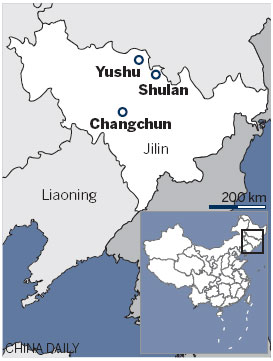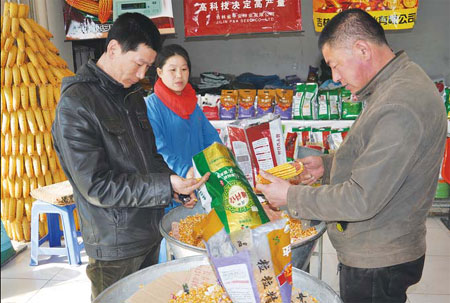Seeds of hope may be gone with the wind
Updated: 2012-03-22 08:12
By He Na and Han Junhong in Jilin (China Daily)
|
||||||||
|
Farmers examine corn seeds at "Seed Street" in Yushu city, Jilin province, where about 200 seed companies have their businesses. [He Na / China Daily] |
"Seed Street"
The Hans lost heart when faced with the huge choice. The fear of buying counterfeit seeds locally led them to travel by long-distance bus to Yushu city, the largest grain production base in the province, clutching a list of preferred seeds, garnered after long consultations with their family and neighbors.
Yushu has more than 320 different seed companies and about 200 of them are on Gongnong Street, known locally simply as "Seed Street". A board hanging in the corridor of the Yushu Agricultural Supervision Team indicates the 471 varieties of corn seeds approved by the Ministry of Agriculture.
"In addition, there are more than 700 varieties of seed named after the local companies that produced them, meaning that at present more than 1,300 different kinds are on sale," said Sun Chengju, the team leader.
Of the 200 seed companies in Yushu's Seed Street, only a few have the ability to conduct research and development. Zhang Xue, director of the Yushu Agriculture Bureau, admitted that the differences in management styles and product quality in these enterprises results in market chaos and distorts competition.
However, this phenomenon is not unique to Yushu, it's widespread in China's Northeast and other provinces and regions. Yushu is just a microcosm of China's seed industry. "Some seed companies mislead customers by misusing trademarks, exaggerating and misrepresentation in their advertisements.
"Using inferior seeds in place of high-quality ones is a common trick practiced by a number of the companies. It can be done easily, just by putting inferior seeds in packages designed for high-end brands," said Xu Lei, chairman of Northern Agriculture Technology Co.
"In 2010, we undertook a special investigation into farming materials and discovered more than 450,000 kg of fake corn seeds. We took emergency measures that directly avoided losses of more than 200 million yuan. It's the largest case of counterfeit seeds in our city so far," said Sun.
"In a bid to guarantee the quality of the seeds, we worked out a number of measures, such as introducing a seed security fund to compensate farmers for losses and a five-shop joint-guarantee system under which if any shop in the group sells fake seeds, the other four receive the same punishment. All the measures were effective, and so far we haven't received a single complaint about fake seeds," he said.
Hoping to attract more customers, some shops are offering free oil, rice and transportation to people buying seeds. Han and his wife trudge between the shops, clutching an ever-increasing number of colorful pamphlets, but after three hours their 2,000 yuan in cash remains firmly in their hands.
"To tell the truth, my eyes are already aching after seeing so many items. No matter which I picked up, the salesmen all said almost the same thing, talking about high yields and a strong tolerance to high winds, drought and insects," Cui said. "Why can't we have more big brands like Pioneer 335? We wouldn't need to make such a hard decision then," she complained.
Spreading the risk
Not only the elderly are baffled by the proliferation of seed varieties. Younger growers, who can boast an education and plenty of experience of working in the fields, have been left scratching their heads too. Han Chang'an, 50, the couple's nephew, grows corn on his 4 hectares of land. He's respected in the village and people always consult him when they have problems in their fields. "It's really hard to choose from so many varieties. So each year I usually buy seven or eight different varieties to spread the risk. I dare not put all my eggs in one basket. If I was unlucky and bought some counterfeit seeds, at least I could still harvest produce from fields where I'd sown other varieties," he said.
Most of the farmers do the same and there are usually at least 30 different strains of corn growing in the village. "Farmers have an obvious blindness when choosing corn seeds. It's usual for one family to grow four or five different strains. They think it's a good way of avoiding risks, but many of these varieties are hard to manage and require different growing regimes, sometimes more water or fertilizer, and that can lead to a decrease in yields," said Sun.
Eventually, after several hours of shopping, Han and his wife bought three different strains of corn to plant on their 1.3 hectares. "The strong winds may not hit us again, so we still bought some Pioneer 335. We also bought a variety called Yufa 188, which was recommended by a neighbor, and some Nongda 2188, suggested by relatives. I've kept all the receipts in case we need to claim compensation," said Cui.
"For farmers like us, growing grain is a gamble. It's only when we've sown the seeds, seen the seedlings and then the big yellow corn, that we can breathe a sigh of relief," she admitted.


 Relief reaches isolated village
Relief reaches isolated village
 Rainfall poses new threats to quake-hit region
Rainfall poses new threats to quake-hit region
 Funerals begin for Boston bombing victims
Funerals begin for Boston bombing victims
 Quake takeaway from China's Air Force
Quake takeaway from China's Air Force
 Obama celebrates young inventors at science fair
Obama celebrates young inventors at science fair
 Earth Day marked around the world
Earth Day marked around the world
 Volunteer team helping students find sense of normalcy
Volunteer team helping students find sense of normalcy
 Ethnic groups quick to join rescue efforts
Ethnic groups quick to join rescue efforts
Most Viewed
Editor's Picks

|

|

|

|

|

|
Today's Top News
Health new priority for quake zone
Xi meets US top military officer
Japan's boats driven out of Diaoyu
China mulls online shopping legislation
Bird flu death toll rises to 22
Putin appoints new ambassador to China
Japanese ships blocked from Diaoyu Islands
Inspired by Guan, more Chinese pick up golf
US Weekly

|

|







